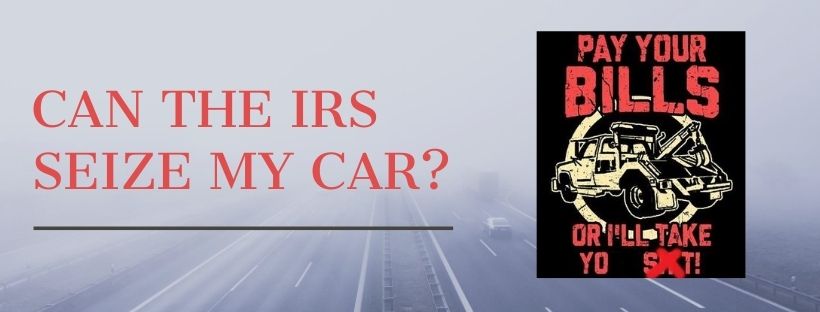What Happens To IRS Debt When You Die?
Are you wondering what happens to the tax debt of a loved one after their death? Unfortunately, any outstanding amount owed isn’t “automatically” wiped clean from the record when a taxpayer passes away. In this post we’ll discuss the general process and give you some tips on how to navigate some of the difficult steps one may encounter.
The role of the executor of the estate. When a person dies, someone may apply to the court requesting that they be allowed to settle the estate. This person could be an heir or the executor of the estate, and is referred to as the estate administrator. Once they have officially been appointed by the probate court, Letters Testamentary are issued to authorize them to act on behalf of the deceased. The estate administrator is responsible for collecting all of the deceased’s assets such as cash, bank accounts, investment accounts, personal property and titles to real estate. They then will ensure that all creditors are paid and then distribute the remaining assets to the heirs.
For example, if you are the estate administrator when your father or mother passes away, you can’t simply distribute their assets to the people named in the will immediately. First, you need to pay off any debts your parent owed at the time they died. If that parent owed taxes to the IRS, they will be included in the debts that must be paid.
Income generated before and after date of death. Sometimes, loved ones may be confused as to what must be included on which tax return. Here, we hope to add some clarity. Income earned up through the date of passing is included on the taxpayers final Form 1040. Any income generated after the day of death is earned by the deceased’s estate.
Filing of tax returns. The estate administrator is the person who is responsible for ensuring that all income tax returns for the deceased have been filed. This includes the final income tax return for the year of death. In this post on our sister site, we discuss how to file a deceased persons tax return.
To find out whether the deceased filed all income tax returns before his death, the estate administrator will have to look through the deceased’s personal records. They can also request information from the IRS to not only check return status, but get missing data (i.e. W2s, 1099s, 1098s, etc) needed to file returns. Check this page on the IRS’ website to learn more and request data.
If the estate earns money that is taxable, either from interest, dividends or rental income, these taxes are paid from the estate. According to the IRS, an estate administrator must file an income tax return for an estate if its assets generate more than $600 in income per year. This is done via IRS Form 1041.
IRS taxes owed at date of death. After you review the deceased’s personal papers and correspondence or you file any outstanding income tax returns, you may discover that your loved one still owes taxes to the IRS. A public records search may reveal that the IRS has already filed a Notice of Federal Tax Lien against the deceased’s home, vacation property, car or other property. The tax lien is official notice that the deceased owes back taxes. The outstanding amount will be deducted from the proceeds of their remaining assets to pay their taxes.
Do relatives have to settle unpaid taxes with personal funds? When a decedent’s assets are insufficient to cover his/her federal income and gift tax liabilities, relatives are generally not responsible for the remaining balances. However, there are some exceptions to this. There are payment obligations for the following individuals when tackling a decedent’s debt:
- Anyone who co-signed for a loan with the decedent,
- Anyone who was a joint account holder with the decedent,
- Spouses in the community property states of Arizona, California, Idaho, Louisiana, Nevada, New Mexico, Texas, Washington and Wisconsin. Community property from a marriage can be put toward debt obligations, but spouses aren’t responsible for debts that predate the marriage.
- Residents of states where law requires a surviving spouse to pay off some of the debts—namely health care expenses, and
- Anyone who shares in any debt of the decedent
Additionally, an executor could be held personally accountable for the tax bill if:
- The executor distributes assets to heirs and beneficiaries before paying the taxes,
- The executor pays off other debts of the estate before paying the tax liabilities, or
- The executor is aware of the insufficient funds and inability to pay the taxes and spends the assets otherwise.
If you still need more information on this topic, feel free to see the Deceased Persons – Probate, Filing Estate and Individual Returns, Paying Taxes Due page at the IRS’ website.
Can the IRS Seize My Car?

You may have heard about the IRS seizing a taxpayers assets for unpaid taxes. These can include, among other things, the vehicles that they own. So the short answer to the question is yes, the IRS can seize a taxpayers vehicle. But let’s discuss the mechanics of how it gets to this point and some other important items shall we?
Why does the IRS seize vehicles? The first thing to know is that if you owe the IRS under $5000, your assets may not necessarily be seized and sold off. Per the 2019 IRS Data Book, in 2018 and 2019 the IRS seized a total of 275 and 228 assets respectively. Also, if you lease property, then you aren’t the legal owner. The IRS can’t seize items you don’t own, unless you have built up equity, or an ownership interest, in a leased asset. For most items, such as a rented auto, you won’t have any equity or it will be too small for the IRS to consider.
In the instances above, the IRS will seek to satisfy the collection of the debt owed through other means. This could include garnishing your income or seizing your federal tax refund. Now if the debt is substantial, then that’s where vehicle seizure comes into play.
The IRS utilizes progressively serious methods to try to collect your tax debt before seizing your vehicle. It will begin by informing you of your tax debt and giving you the opportunity to pay it. When they have sent numerous notices and attempted to collect, but have been unable to or can’t communicate with you regarding a reasonable plan for repaying your debt, it will proceed to file a federal tax lien against you. The Notice of Federal Tax Lien will alert creditors that the government has a legal right to your property.
Once other methods of collection have been exhausted, the IRS will use its power to seize assets by use of a levy. An IRS levy permits the legal seizure of your property to satisfy a tax debt.
How does the IRS seize a vehicle? A typical IRS seizure usually goes as follows:
- Local law enforcement accompanies IRS Revenue Officers so they are not interfered with nor attacked.
- The Revenue Officers will present their credentials to the taxpayer as well as the order (typically from a judge) that states they have a right to take the property.
- The IRS contractors (e.g. towing companies) will then secure the asset and remove it from the property for storage at a IRS facility.
We scoured the internet for a video showing an actual IRS vehicle seizure in process. This very dated video is all we could come up with. Regardless of how old it is, note how high the tension is!
What does the IRS do with the seized vehicles? The first thing that happens is that the vehicle gets moved to a storage facility. Next, the taxpayer is usually given one last attempt to settle the debt and reclaim the asset. But simultaneously, the IRS post public notice that the item is available for purchase from the US Government.
Generally speaking, the vehicle will be sold off relatively quickly, usually at an auction that is open to the public. The money raised from the sale is then applied to the tax debt that you owe to the IRS. The goal of seizing assets is to satisfy the debt as quickly as possible since you failed to pay it off yourself.
The image below shows seized vehicles by the IRS and how they notify the public of an auction. Anyone want to purchase a 2018 Ferrari??

How to avoid seizure. The best way to avoid having your assets seized is to file your taxes and pay what you owe on time each year. However, if you cannot fulfill either of these obligations, you should communicate with the IRS and be honest about your financial situation.
You could be eligible for a payment arrangement, which would allow you to pay off your debt in monthly payments. The arrangement will take into consideration:
- How much money you make
- Your household size
- How much you pay in rent, utilities, and other basic expenses
- The total value of your assets
The IRS will then determine a monthly amount that you should be able to pay toward your debt. In extraordinary situations, your tax debt could be forgiven. Forgiving a tax debt is a rare occurrence. However, it could be possible if you experience hardships like:
- High medical costs
- Divorce
- Death of an immediate family member
- Terminal illness
- Job loss
- Slowing down of your business
How a Virtual Assistant Can Help You Survive Covid-19

In early 2020, the Covid-19 pandemic forced many businesses to alter their operations. At best, this meant converting brick and mortar offerings into virtual options. At worst, it meant shutting down until stay-at-home orders were lifted. But now that restrictions are being lifted, some are still finding it hard to get back to “normal” so to speak. Well, an option that might help one achieve that normal could be a virtual assistant.
What is a virtual assistant?
A virtual assistant (VA), as the name implies, is an assistant that helps and supports your business virtually. This does not mean that the person is a robot or some type of computer. It simply means that the person is based at a remote location and not within your office. A VA is trained to assist you, and your business, when called upon.
Advancements in technology, the presence of the internet, along with document-sharing and other business-related software, makes it easier for people to work remotely. Because many businesses no longer “need” people to physically be present at the same location for them to work, VAs could be a good option for some.
What services does a VA offer?
Depending what needs your business has, a VA can assist with almost any and every work-related task. Some of the most common tasks that a business will allocate to a VA include:
- Operational and administrative tasks
- Phone management
- Event management
- Managing calendars, appointments and emails
- Preparing reports
- Personal tasks like booking hotels and restaurants
- Social media management
- Content management
- Simple digital marketing tasks
- Community management
- Website design
Take one of our clients for example. Edmond Virtual Assistant Services offers VA services here in the greater Chicagoland area. Their offerings are centered around four areas/groupings:
- Executive Support
- Productivity
- Marketing & Social Media
- Special Services
In addition to the above, companies can hire role-specific VAs to handle specialized duties as well. In these scenarios, VAs have a specific skill set that only allows them to tackle just one operational area. For example, the person could only work on tasks associated with sales and marketing, public relations, or customer service.
How can a VA help you survive Covid-19?
Many businesses have had to try and retool their operations in the wake of Covid-19. If you’ve had to close your brick-and-mortar location, but still have the ability to sell your goods virtually, a VA could be a key addition. Even if you are still operating a physical location offering something like curbside pickup, a VA could function remotely to help take customer calls, schedule pickups and coordinate orders. With that said, here are some additional ways that a VA might be able to help you weather this storm.
Reduce operational costs. Since VAs work on their own from a remote location, businesses can save money related to their own location and equipment costs. Furthermore, since the concept of a VA states that the person would be providing their services on a contract basis, VAs have an unsaid understanding with companies to not expect payment unless they are actually working or producing deliverables.
Access to needed skills. One of the foremost reasons why small businesses and solopreneurs hire VAs is to get easy access to skills and expertise, which otherwise would either be too costly to hire for or too time-consuming to do by ones self. Remember, most entrepreneurs are good at what they trained or went to school for. Administrative tasks don’t always fall within their wheelhouse.
Imagine you’re an entrepreneur running a small restaurant that only offered in-person dining pre-Covid-19. Now you are going to offer carry-out as well as curbside pickup, but you don’t have the technology structure in place to make that happen quickly nor seamlessly.
While you can choose to do so by going the long route of hiring a person or technology firm, the option of hiring a hit-the-ground-running “tech” VA could be the more beneficial route. This enables you to quickly get things in place in no time in a much more cost-effective manner.
Maintain Quality service. The simplest reason for most companies to hire VA is to have efficient business operations in place. Hiring a VA enables businesses to employ reasonable resources to fulfill tasks that internal employees either don’t have the time for or aren’t qualified enough to tackle.
Let’s say that your business has had to reduce staff levels to try and survive financially. You’re operating with a limited skeleton crew or worse, you simply had to let people go. Some of those people, might have been really talented workers or those with years of expertise. Now your stuck trying to “limp along” until things get better. This might even mean the business owner doing things they don’t really know how to, nor want to do. Furthermore, they could find themselves simply doing too much, which leads to increased production times, order fulfillment or decreased customer satisfaction.
Having a VA in place to assist with some of the mission critical operations at this time could be just what is needed.
Decreasing the owners workload. Have you found yourself in a situation lately where you missed your kid’s activity (e.g. school e-learning Zoom) because you were either too busy handling “things” or because “something came up” at work?
Saving time and decreasing your workload go hand-in-hand when it comes to outlining the benefits of hiring a VA. Having a VA who can handle those “things” or tackle that “something at work” can help you find more time and therefore reduce your increased workload.
Time management. Hiring VAs empowers businesses to utilize their time more efficiently. For example, would you rather waste four hours a day doing tasks like cleaning out your inbox or spend those four hours conceptualizing innovative strategies to help your business survive?
That’s a no-brainer, right? Having a VA working for you to handle such tasks that could potentially eat up your time, helps you regain lost time that you can invest in working on your business rather than in it.
Promote your ability to service customers during Covid-19. There are many businesses that are NOT open for “business as usual” as a result of this pandemic. Getting a VA on board can help a business focus on multiple advertising tasks at the same time to let customers know that you ARE open and ready to accept customers business.
This may include promoting availability on social media, running online campaigns, or submitting stories to newspapers. Having someone dedicated to keeping consumers up to date on a businesses’ sometimes “ever changing” Covid-19 operations, could just be the difference between staying open in the long run or turning out the lights for good!
Real Estate Agent Tax Deductions

Maximizing your tax deductions as a real estate broker or agent is not solely about finding things to deduct. While that is a large part of it, also involved is being knowledgeable about what is deductible AND then tracking said deductions. I mean, if you fail to track what you can deduct, then how can you actually deduct it? Sure, you can estimate or even make it up. But guess what? That is a sure-fire way to have the IRS disallow the expense if they decide to audit your return.
To ensure that you don’t miss any business related expenses paid for during the tax year, it’s recommended that one use a tax organizer. Feel free to use our handy dandy tax organizer (checklist) as a starting point.
From there, make sure that you aren’t forgetting any of the expenses typically deducted by those in your profession. What are those? While this list is not entirely inclusive or comprehensive, it does cover most of the major items:
Advertising
- Billboards
- Brochures/Flyers
- Business Cards
- Copy Editor Fees
- Direct Mail
- Email Marketing and Newsletters
- Internet Ads (Google, Facebook, etc.)
- Leads/Mailing Lists
- Post Cards
- Print Ads (Newspapers and Magazines)
- Promotional Materials
- Signage/Banners
- Web Hosting and Domain Fees
Auto Expenses
- Car Washes
- Gas
- Insurance
- Interest
- License/Registration
- Maintenance
- Repairs
- Tires
Business Travel
- Airfare
- Car Rental
- Lodging
- Meals
- Parking/Tolls
- Taxi, Train, Subway, Bus
Communication
- Answering Services
- Cell Phone Service
- Fax Expenses/eFax
- Internet Service
- Office Telephone/VOIP
Equipment
- Camera/Lenses
- Cellphone/Smartphone
- Cleaning Equipment
- Computer
- Hard Drives/Thumb Drives
- iPad/Tablet PC/Android
- Laptop
- Lock Boxes/Locksmiths/Keys
- Printer
- Scanner
Employee Wages
- Clerical Support
- Family Wages (e.g. kids/spouses)
- Payroll/Unemployment Taxes
- Sales Assistant
- Virtual Assistant
Office Expenses
- Desk Fees
- Client Refreshments (Coffee, Water, etc.)
- Copier Fees
- Janitorial Services
- Office Furniture
- Office Supplies
- Office Rent
- Online Storage of Business Files
- Software
Professional Fees
- Association Dues/Fees
- Chamber of Commerce
- Bookkeeping Fees
- Business Licenses
- E & O Insurance
- Franchise/Affiliation Fees
- Legal Fees
- MLS Fees
- Tax Prep Fees
Retirement
- Defined Benefit Plan
- Simplified Employee Pension (SEP)
- Simple IRA
- Solo 401k
Training & Improvement
- Books (Sales Books, Real Estate Books, etc.)
- Continuing Education
- Newsletter Subscriptions
- Sales Training/Coaching
- Seminars
Looking for more ways to save on taxes?
Jared’s latest book, The Real Estate Brokers Little Black Tax Book is chock full of tips and strategies to help you cut your tax bill. Sure, you can buy it by clicking the book image at the top of this page, BUT, if you head over to this super secret page, you can get some free goodies. Like see a video where Jared discusses the book and get the free white paper, The 10 Tax Issues Broker Face. So what are you waiting for? The sooner you take action, the sooner you can keep more of your hard earned commissions in YOUR pocket and out of the hands of Uncle Sam!
A Bike, A Storm, A Reminder About Life

As I write this, the world is at a standstill due to Covid-19. Riding my bike during a recent rain storm reminded me of an important life lesson. What was the lesson? That the sun always shines brightest after a rain storm!
Anyone who knows me is aware of the fact that I love cycling. Not only do I ride bikes, I race them at the amateur level. It’s this racing aspect that requires me to do tons of training, especially during the summer. So today, even though there was the threat of rain, I decided to go for a decent ride (40 miles). It was my hope, that I would at least be able to make it to the halfway point without getting soaked.
I was fortunate enough to make it to mile 20 with zero precipitation. But when I turned North to head back home, I could see the storms clouds off in the distance. What was “worse” was that I could hear tons of thunder. While it sounds super cool, typically where there’s thunder there’s lightning. By the way the storm was tracking, I could tell that I was going to miss the brunt of it. But there was a chance that I would get caught by the edge, if I didn’t high tail it back home.
Head down and pushing hard, I told myself if I could get 5 miles North, I might be okay. But about 3 miles up the road, the clouds opened up and started to pour big drops of rain. Not a problem for me. I like being in the rain, and always have since I was a kid. While others sought shelter during storms, I was the weirdo out splashing in puddles just soaking it up. Thunder, lightning, wind and all. Blame the Aquarian in me; it’s the sign of the water bearer! Heck, I did’t even own an umbrella until I started my professional career.
So I kept pushing on, getting wet and marveling at the thunder and how loud it was. However, there was lightning. At first it wasn’t a big deal and the strikes were intermittent. But then there was one strike that was super bright and a little too close to home for me. The one thing that all cyclist are trained is that if there is lightning, it’s best to seek shelter. I mean, it’s not a great idea to be rolling around on a tiny piece of metal when there is a bunch of electricity in the air! So I saw a archway at a building and decided to wait it out. Maybe it was a church? Maybe it was a school? Maybe it was a Catholic school which is why I thought it was a church? Who knows.
As I stood under the archway I was wet, but out of the rain and hopefully clear of getting stuck by lightning. I checked the radar and it looked like the rain was going to 100% stop in about 20 minutes. I text my wife so she would know that I was waiting it out and was safe. Once the worst part of the storm passed, I got back on the bike and resumed my ride. As I was riding, the sun came out as if the almighty themselves had parted the clouds to say hello. It was in that moment that I was reminded of the life lesson I mentioned above. It was also when I decided to take that picture around Wolf Lake!
When we humans are faced with adversity, challenge, struggle and the like, we often go through several phases. In honor of the letter “R” (like my last name) I have named these phases:
- Reject
- Resolve
- Reset
- Resume
- Rejoice
You may not have noticed these phases above, but if you go back you can see them all. I rejected the fact that I was about to get caught in a thunderstorm. I resolved that it would happen and sought shelter. During this time, I reset and prepared to ride home wet and in the rain. Once the worst was past, I resumed my ride. Lastly, when the sun came out, I rejoiced and almost forgot about the dangerous lightning that I had been riding through.
While things seem bad and scary around the world right now, it’s good to keep the cycle above in mind. At some point in time, this too will pass. It will be behind us and a long way down the road, it will feel like a distant memory. Right now we may be in the reset phase. All of the Summer sporting activities I love, the lakefront trail, vacations and gatherings with friends are put on hold. I’ve resolved myself to believe that we won’t be able to “resume” until we get to 2021. Hopefully at that time, I can head to the track and “go fast and turn left” with all of my friends as the 2020 season has pretty much been shelved.
Until then, let’s all try to keep one another safe. Practice good hygiene, make sure you social distance, protect the most vulnerable around you and remember to tell those you care about, that you love them on a frequent basis. But never forget, after a storm, the sun always shines bright!




